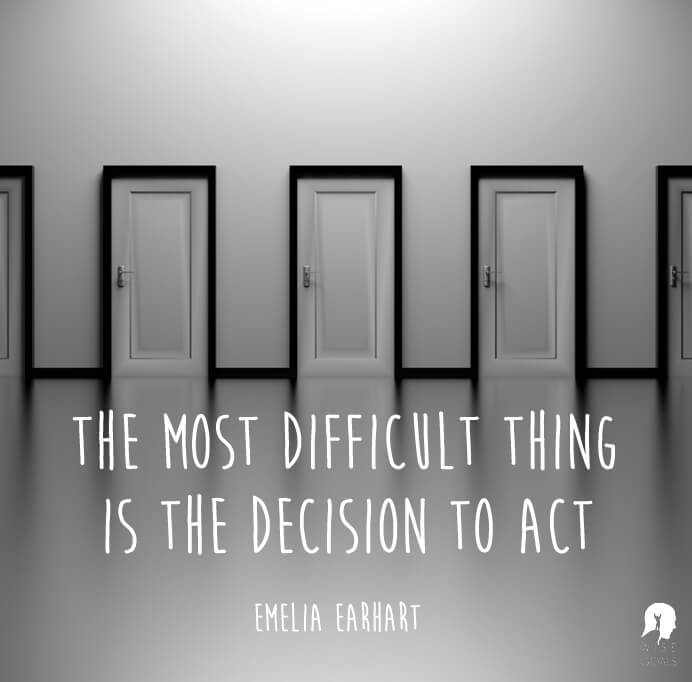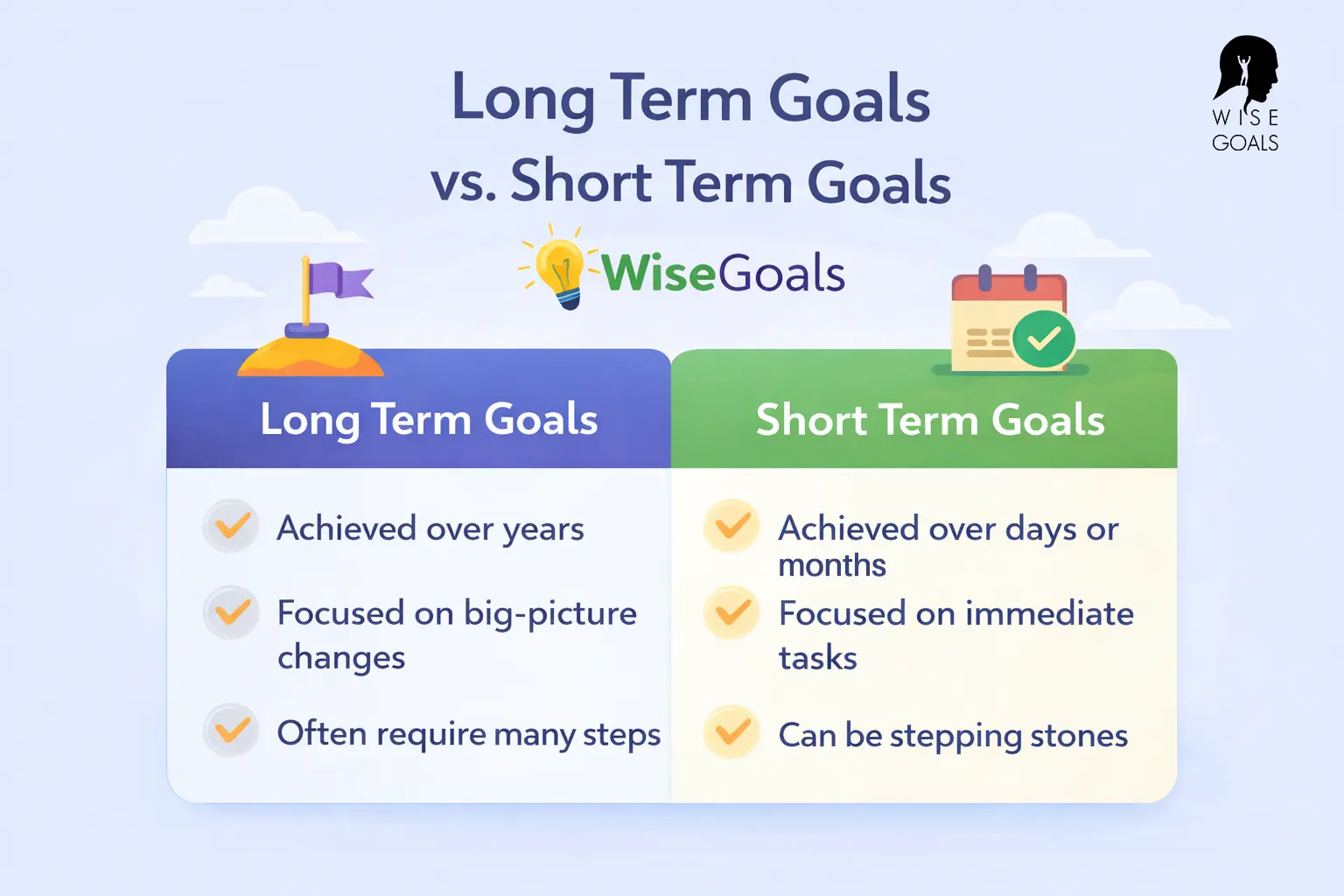- Home
- All about Goal Setting
- Types of Goals (Outcome, process etc)
- Short Term Goals
The Power of Short-Term Goals: Building Success, One Step at a Time
When it comes to personal development and achievement, setting short-term goals is a key driver of progress. Goals provide direction, motivation, and a sense of purpose, guiding you towards your desired outcomes.
While long-term goals are essential for outlining overarching aspirations, it's the short-term goals that truly pave the way for success. Let's discuss the significance of short-term goals, exploring how they can be both outcomes and processes on the journey to success.

Defining Short-Term Goals
Before delving into the intricacies of short-term goals, let's establish a clear understanding of what they entail.
Short-term goals are essentially objectives that can be achieved within a relatively brief timeframe, typically ranging from a few days to a few months. Unlike long-term goals, which may span years or even decades, short-term goals are more immediate in nature, focusing on tangible outcomes or actionable steps that contribute to larger objectives.
The Versatility of Short-Term Goals
One of the most remarkable aspects of short-term goals is their versatility. They can take various forms, serving different purposes depending on the context and individual preferences.
Short-term goals can be outcomes-driven, focusing on specific results or achievements within a defined timeframe. For instance, a short-term goal could be to increase monthly sales by 10% or to complete a project ahead of schedule.
On the other hand, short-term goals can also be process-oriented, emphasizing the actions and behaviors necessary to progress towards a desired outcome. These goals are less about specific results and more about establishing habits, routines, and workflows that facilitate success.
Examples of process-oriented short-term goals include dedicating a certain amount of time each day to skill development, maintaining regular communication with team members, or adhering to a structured exercise routine.

The Benefits of Short-Term Goals
Embracing short-term goals offers many benefits that contribute to personal and professional growth. Here are some of the key advantages:
Enhanced Focus and Motivation - Short-term goals provide clarity and direction, helping you concentrate your efforts on specific tasks and objectives. By breaking down larger goals into smaller, manageable chunks, short-term goals prevent overwhelm and foster a sense of progress, which, in turn, boosts motivation and momentum. Without short-term goals you run the risk of your goals being fantasies.
Increased Accountability - Setting short-term goals creates self-accountability by establishing clear benchmarks for success. Regularly monitoring progress towards your goals enables you to track your performance, identify areas for improvement, and make necessary adjustments to stay on track. Be sure to keep your goals in clear sight once you select them, even if they're a work in progress. It's too easily done to forget they've even been chosen at all.
Flexibility and Adaptability - Short-term goals offer greater flexibility and adaptability, allowing you to respond to changing circumstances and priorities. Unlike long-term plans, which may be more challenging to modify, short-term goals can be adjusted or revised as needed, ensuring alignment with current objectives and circumstances. What's the most important thing to tackle right now? This is a powerful question if asked regularly and answered honestly.
Celebrating Achievements - Achieving short-term goals provides a sense of accomplishment and validation, reinforcing positive behaviors and encouraging continued effort. Psychologists recommend only shooting for a little outside your comfort zone so you can build self-efficacy. Celebrating these small victories cultivates a positive mindset and reinforces the belief that progress is possible, fuelling further motivation and commitment. Aiming too high can often be counter-productive.
Building Momentum - Short-term goals serve as building blocks for long-term success, laying the foundation for sustained progress and growth. By consistently achieving short-term milestones, you build momentum and confidence, propelling you closer to your longer-term goals and aspirations.

Implementing Short-Term Goals Effectively
While the benefits of short-term goals are undeniable, realizing their full potential requires thoughtful planning and execution. Here are some strategies for implementing short-term goals effectively:
SMART Goals - Are your short-term goals Specific, Measurable, Achievable, Relevant, and Time-bound (SMART)? Clear and well-defined goals are easier to pursue and track progress, increasing the likelihood of success.
Prioritize and Sequence Goals - Identify the most critical short-term goals that will have the greatest impact on your overall objectives. Prioritize these goals based on their importance and sequence them in a logical order to maximize efficiency and effectiveness. When it comes to this kind of planning remember it's a skill, so focus on progress and learning over perfection.
Break Goals into Actionable Steps - Divide each short-term goal into smaller, actionable steps or tasks that you can tackle incrementally. This approach makes goals more manageable and helps prevent procrastination or overwhelm. Brian Tracy said that for every minute spent planning, you save 10.
Monitor Progress Regularly - Establish regular checkpoints to monitor progress towards your short-term goals. Use tracking tools, journals, or accountability partners to stay accountable and assess your performance objectively. Do whatever it takes to make sure your goals don't get forgotten or lost.
Adjust and Pivot as Needed - Be open to adjusting or pivoting your short-term goals based on feedback, changing circumstances, or new information. Adaptability is key to staying agile and resilient in pursuit of your objectives.

Examples of short-term goals across various domains
Professional Development
- Attend a networking event or workshop within the next month to expand professional connections and gain new insights.
- Complete an online course or certification related to your field of expertise within the next three months to enhance skills and knowledge.
Health and Wellness
- Exercise for at least 30 minutes, five days a week, for the next month to improve physical fitness and overall well-being.
- Prepare and eat homemade meals for dinner at least four times a week for the next two months to prioritize nutritious eating habits.
Personal Finance
- Create and adhere to a weekly budget for the next three months to track spending and save towards a specific financial goal, such as a vacation or emergency fund.
- Reduce discretionary spending by 20% over the next two months to free up funds for savings or debt repayment.
Time Management/Productivity
- Implement a daily prioritization system, such as the Eisenhower Matrix, for the next month to focus on high-value tasks and increase productivity.
- Set aside 15 minutes at the beginning or end of each workday to review goals, plan tasks, and organize priorities for the next day.
Personal Growth and Learning
- Read or listen to one non-fiction book related to personal development or a new skill area within the next two weeks to foster continuous learning and growth.
- Practice mindfulness or meditation for 10 minutes each day for the next month to reduce stress, enhance focus, and promote emotional well-being.
Conclusion
In conclusion, short-term goals are a powerful tool for driving progress and achieving success, whether in personal or professional endeavors.
By embracing short-term goals as both outcomes and processes, individuals can break down complex objectives into manageable tasks, cultivate focus and motivation, and build momentum towards their long-term aspirations.
By setting clear, actionable goals, monitoring progress, and remaining flexible in their approach, individuals can unleash the full potential of short-term goals to realize their dreams and aspirations. So, what short-term goals will you set today to propel yourself closer to your ultimate vision of success?
- Home
- All about Goal Setting
- Types of Goals (Outcome, process etc)
- Short Term Goals
Affiliated With
We are proud to be part of professional networks that value evidence-based practice, inclusion, and social impact.



